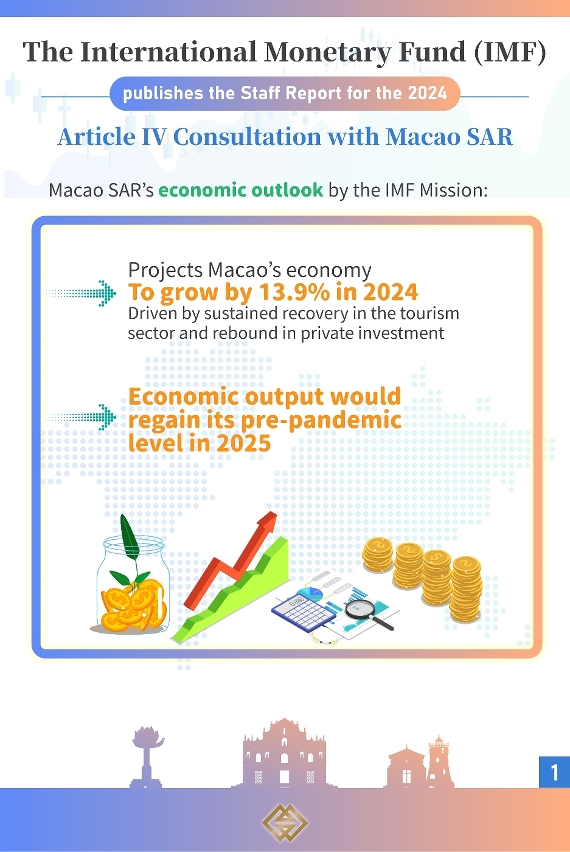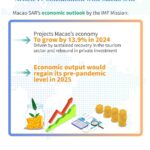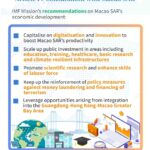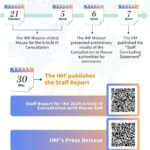 The IMF concludes the 2024 Article IV Consultation with Macao SAR
The IMF concludes the 2024 Article IV Consultation with Macao SAR
The International Monetary Fund (IMF) has concluded the 2024 Article IV Consultation with Macao Special Administrative Region (Macao SAR) and published its Staff Report today (30 May). The Mission affirmed the SAR Government’s efforts on promoting appropriate economic diversification, and projected Macao SAR’s economy to grow by 13.9% this year.
IMF Affirms Macao SAR’s Appropriate Economic Diversification Policies
The IMF Mission conducted its Article IV Consultation for Macao SAR during 21 February to 6 March 2024 while the Staff Concluding Statement was published on 7 March. The Staff Report, a more comprehensive assessment of Macao SAR’s macroeconomic and financial positions, has been released today (30 May 2024, US time).
The IMF enunciated the robust post-pandemic recovery exhibited by Macao’s economy, and concurred that effective implementation of appropriate economic diversification policies would strengthen the SAR’s economic resilience. On the back of sustained recovery in the tourism sector and rebound in private investment, the IMF projected Macao SAR’s economy to grow by 13.9% this year while economic output would regain its pre-pandemic level in 2025. Moreover, the IMF envisaged Macao’s economic growth would converge to a long-term potential of 3.0%, as propelled by the SAR Government’s endeavour to promote appropriate economic diversification alongside the development of non-gaming tourism and expansion of international markets, coupled with Macao SAR’s accelerated integration into the Guangdong-Hong Kong-Macao Greater Bay Area (GBA).
IMF Recommends to Capitalise on Digitalisation and Innovation to Enhance Macao SAR’s Productivity
The IMF stated that Macao’s economy had witnessed a significant advancement in terms of digitalisation. Meanwhile, the IMF suggested the SAR Government to scale up public investment in areas including education, training, healthcare, basic research and climate-resilient infrastructures, as well as to support digital transformation of small- and medium-sized enterprises, which would in turn enhance Macao’s productivity and resilience against economic shocks. In addition, the IMF recommended the SAR Government to leverage opportunities arising from integration into the GBA, so as to forge ahead with the policy objectives of appropriate economic diversification in Macao SAR.
On the front of promoting modern financial services, the IMF affirmed that the reformulated Financial System Act (FSA) had enhanced the flexibility of Macao SAR’s legal framework for financial regulation, laying the legal basis for innovation and modernisation of the financial sector. According to the IMF’s feature analysis, Macao’s banking system remained sound while sufficient capital and liquidity buffers would buttress the banking system’s resilience to withstand external shocks. Besides, the IMF welcomed the SAR Government’s ongoing efforts in anti-money laundering/combating the financing of terrorism (AML/CFT), and recommended to keep up the reinforcement of relevant policy measures.
The IMF reaffirmed that the linked exchange rate system (LERS) between the Macao pataca (MOP) and the Hong Kong dollar (HKD) had rendered credible support to Macao SAR’s economic and financial stability. Meanwhile, key factors such as stringent fiscal discipline, a sound banking system, adequate foreign exchange reserves and a flexible labour market, would underpin the effective operation of the LERS.
The Staff Report and the relevant press release have been published on the IMF website. The next IMF Article IV Consultation with Macao SAR will take place on the preset 24-month cycle.





